10th Villarceaux Declaration
of Eating City Summer Campus 2024
Read more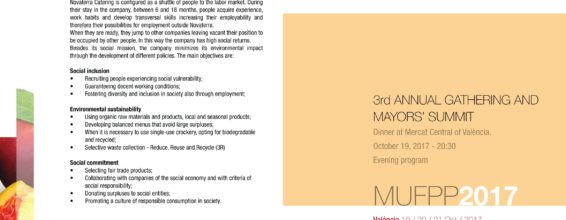

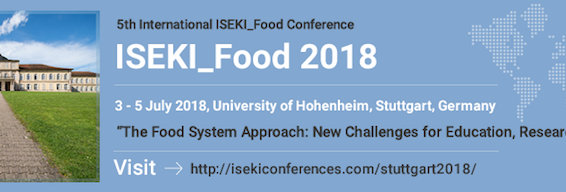
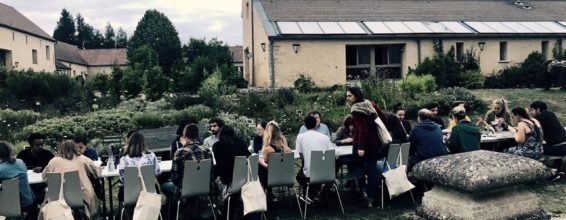
EC is proud to contribute to one of their actions called “Mon restau responsable” (My Sustainable Restaurant) which is a French catering scheme for School canteens, restaurants, cafeterias, hospitals, leisure centers …
“Mon restau Responsable” encourages Public Food Services to opt for responsible purchases (organic, quality, local, fair), reduce and manage waste, control costs, educate teams and guests about the process involved.
Indeed, EC presented the programme during the workshop entitled “The role of collective catering in the paradigm shift in food systems” organised during the last CLIMATE CHANCE conference in Nantes, France in September 2016.
Through auto-evaluation, it aims to provide catering teams, the organizations that accompany them, the decision-makers who manage them, the producers who supply them with benchmarks and tools to accompany their evolution towards more sustainable practices.
Such a system is an unexpected and unprecedented opportunity in the world to allow the academic world to study the multiple factors that contribute to the possible synergies that can make collective catering a real leverage for sustainable food chains.
By choosing this collaborative tool, “Mon restau responsable” everyone is able to take part in this movement.
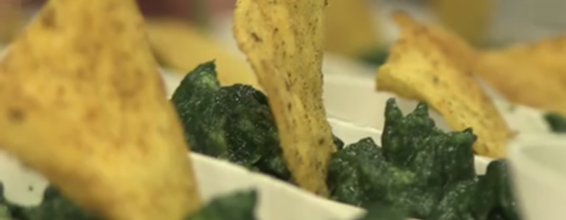
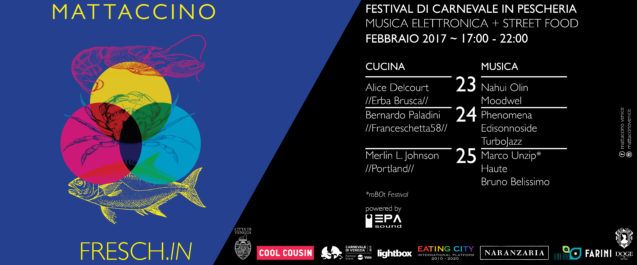
Why Venice?
Venice is, by its nature, morphology and history the ideal place to speak about algae and innovation, as in past centuries this city has been the entry point for so many spices and great innovations. Today it can strive to be forerunner of a new urban food system also based on the spirulina as source of proteins and other important nutrients.
Why the Carnival?
From its origin, the carnival has strong relationships with the food, as recalled by the etymology of the word Carnevale: “Carne Levare” (to remove meat). Spiruline high content of vegetarian proteins as well as precious nutrients all dressed with intense green does not deny Carnival’s history, for it has been characterized since the beginning by extravagance and abundance and provides an extra touch of resilience.
Why the spirulina?
Indeed, Spirulina is a microalgae, a phytoplankton and on of the first life form able to live in the inhospital conditions on Earth, about 3 and half billions years ago.
It belongs to the group of cyanobacteria, precursor of the photosynthesis, the first producers of O2 which allowed life to colonize seas and continents. Today as previously, plankton is having a key role, too little acknowledged, on ecosystems functioning and in particular on the trophic chain.
As we rediscover the value of traditions for our food and the impact of our meals on health, wellness, quality of life, environmental resilience, social cohesion and local development, the fitoplankton spirulina can also play its part also in such a frame …
Indeed to use spirulina to feed people is not a recent invention, at most a rediscovery, as shown by african women collecting it in the area of lake Chad and preparing small patties to eat with cereal but also the italian spacewoman Samantha Cristoforetti who gave preference to food prepared with high quality ingredients to bring with her on board of the International Space Station. She included the spirulina, rich of vegetal proteins with all essential amino acids, but also vitamins, minerals, etc…
And during the Fresch in festival, the same spirulina is invited as one of the ingredients of some of the sandwiches proposed to the visitors…Produced in a small farm with high quality standards, it gently refreshes our traditionnal recipes with a hint of innovation, whereas the phytotière, specially developed to allow a domestic production of spirulina opens new perspectives on our daily food.
Come and join us on 22, 23 and 25 february in Venice to know more: Facebook Event
Learn more about La Voie Bleue.
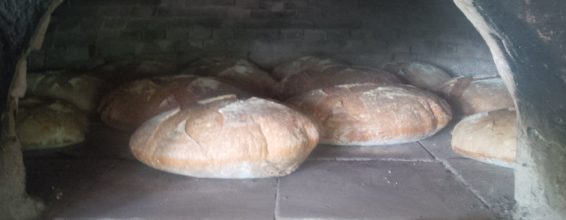

The present globalization movement was encouraged because it allowed to prospect an efficient worldwide based food production system. However, such system, handled today by private operators, is causing increasing problems. On one hand because it is based on intensive methods of production that are harming the environment and endangering subsistence farming. On another hand, because the resulting model of diet, despite it apparently solves starvation, is accentuating nutritional imbalances and food related pathologies among the populations. These and other reasons have been invoked to induce cities to come back to local food sourcing (both urban and peri-urban agriculture), in order to match citizens’ basic food needs and also to re-appropriate urban food logistics management.
To handle such complex issues, however, cities must revise their usual competences, and need for that, to build up a vision in which the food issue shifts from its mere definition to a more systemic understanding. Indeed, food is not only a sum of calories and nutrients necessary to make our body working, but it is embedded in a whole system that influences our quality of life and includes all activities and infrastructures necessary to grow, harvest, process, package, transport, market, consume, and dispose food and all food-related items. This life-cycle thinking approach allows to build a model of food lifespan from origin to plate that makes possible to identify all food-related activities and infrastructures in and out the city and to design an organization chart that connects all actors and stakeholders involved in the food supply chain, giving them a role and a responsibility.
It is very important that urban planners and city managers understand that such a model is not self-standing. This is because “food systems” run within and are strongly influenced by cultural, social, economic and environmental contexts, all relationships that allows to make synergies between food planning policy and other mainstream urban policies about more usual issues such as mobility, education, health, etc.
Planning policy and other mainstream urban policies about more usual issues such as mobility, education, health, etc.
Indeed:

The Declaration for a Food and Agriculture Transition in the Mediterranean was presented within a workshop held on 17th November in the COP22, with its first 50 signatory organisations from 13 different Mediterranean countries.
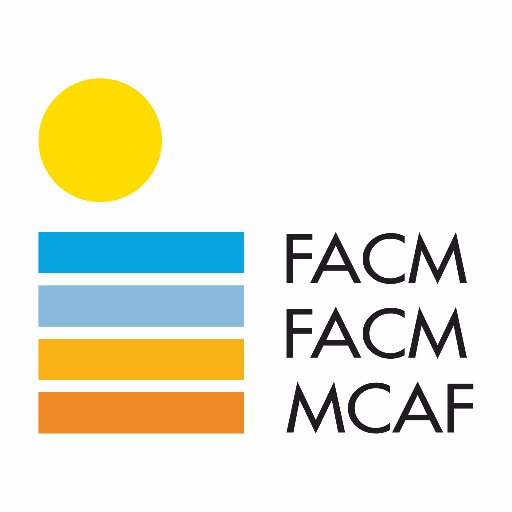
No doubts subsist that Food and climate issues are inextricably bound up. In this context Mediterranean Food Systems are under the spotlights, not only because Mediterranean diet was inscribed in 2013 on the Representative List of the Intangible Cultural Heritage of Humanity.
If the intangible Cultural heritage celebrates and commemorates “a set of skills, knowledge, rituals, symbols and traditions concerning crops, harvesting, fishing, animal husbandry, conservation, processing, cooking, and particularly the sharing and consumption of food“, the document of MCAF highlights how decades of amnesy is detrimental for the current preparation of future actions to preserve environment, health, jobs, quality of life, culture, for mediterranean populations…
The declaration can be downloaded in:
To endorse the declaration, more information can be asked at the following address secretariat@fundacionacm.org




EC is proud to contribute to one of their actions called “Mon restau responsable” (My Sustainable Restaurant) which is a French catering scheme for School canteens, restaurants, cafeterias, hospitals, leisure centers …
“Mon restau Responsable” encourages Public Food Services to opt for responsible purchases (organic, quality, local, fair), reduce and manage waste, control costs, educate teams and guests about the process involved.
Indeed, EC presented the programme during the workshop entitled “The role of collective catering in the paradigm shift in food systems” organised during the last CLIMATE CHANCE conference in Nantes, France in September 2016.
Through auto-evaluation, it aims to provide catering teams, the organizations that accompany them, the decision-makers who manage them, the producers who supply them with benchmarks and tools to accompany their evolution towards more sustainable practices.
Such a system is an unexpected and unprecedented opportunity in the world to allow the academic world to study the multiple factors that contribute to the possible synergies that can make collective catering a real leverage for sustainable food chains.
By choosing this collaborative tool, “Mon restau responsable” everyone is able to take part in this movement.


Why Venice?
Venice is, by its nature, morphology and history the ideal place to speak about algae and innovation, as in past centuries this city has been the entry point for so many spices and great innovations. Today it can strive to be forerunner of a new urban food system also based on the spirulina as source of proteins and other important nutrients.
Why the Carnival?
From its origin, the carnival has strong relationships with the food, as recalled by the etymology of the word Carnevale: “Carne Levare” (to remove meat). Spiruline high content of vegetarian proteins as well as precious nutrients all dressed with intense green does not deny Carnival’s history, for it has been characterized since the beginning by extravagance and abundance and provides an extra touch of resilience.
Why the spirulina?
Indeed, Spirulina is a microalgae, a phytoplankton and on of the first life form able to live in the inhospital conditions on Earth, about 3 and half billions years ago.
It belongs to the group of cyanobacteria, precursor of the photosynthesis, the first producers of O2 which allowed life to colonize seas and continents. Today as previously, plankton is having a key role, too little acknowledged, on ecosystems functioning and in particular on the trophic chain.
As we rediscover the value of traditions for our food and the impact of our meals on health, wellness, quality of life, environmental resilience, social cohesion and local development, the fitoplankton spirulina can also play its part also in such a frame …
Indeed to use spirulina to feed people is not a recent invention, at most a rediscovery, as shown by african women collecting it in the area of lake Chad and preparing small patties to eat with cereal but also the italian spacewoman Samantha Cristoforetti who gave preference to food prepared with high quality ingredients to bring with her on board of the International Space Station. She included the spirulina, rich of vegetal proteins with all essential amino acids, but also vitamins, minerals, etc…
And during the Fresch in festival, the same spirulina is invited as one of the ingredients of some of the sandwiches proposed to the visitors…Produced in a small farm with high quality standards, it gently refreshes our traditionnal recipes with a hint of innovation, whereas the phytotière, specially developed to allow a domestic production of spirulina opens new perspectives on our daily food.
Come and join us on 22, 23 and 25 february in Venice to know more: Facebook Event
Learn more about La Voie Bleue.


The present globalization movement was encouraged because it allowed to prospect an efficient worldwide based food production system. However, such system, handled today by private operators, is causing increasing problems. On one hand because it is based on intensive methods of production that are harming the environment and endangering subsistence farming. On another hand, because the resulting model of diet, despite it apparently solves starvation, is accentuating nutritional imbalances and food related pathologies among the populations. These and other reasons have been invoked to induce cities to come back to local food sourcing (both urban and peri-urban agriculture), in order to match citizens’ basic food needs and also to re-appropriate urban food logistics management.
To handle such complex issues, however, cities must revise their usual competences, and need for that, to build up a vision in which the food issue shifts from its mere definition to a more systemic understanding. Indeed, food is not only a sum of calories and nutrients necessary to make our body working, but it is embedded in a whole system that influences our quality of life and includes all activities and infrastructures necessary to grow, harvest, process, package, transport, market, consume, and dispose food and all food-related items. This life-cycle thinking approach allows to build a model of food lifespan from origin to plate that makes possible to identify all food-related activities and infrastructures in and out the city and to design an organization chart that connects all actors and stakeholders involved in the food supply chain, giving them a role and a responsibility.
It is very important that urban planners and city managers understand that such a model is not self-standing. This is because “food systems” run within and are strongly influenced by cultural, social, economic and environmental contexts, all relationships that allows to make synergies between food planning policy and other mainstream urban policies about more usual issues such as mobility, education, health, etc.
Planning policy and other mainstream urban policies about more usual issues such as mobility, education, health, etc.
Indeed:

The Declaration for a Food and Agriculture Transition in the Mediterranean was presented within a workshop held on 17th November in the COP22, with its first 50 signatory organisations from 13 different Mediterranean countries.

No doubts subsist that Food and climate issues are inextricably bound up. In this context Mediterranean Food Systems are under the spotlights, not only because Mediterranean diet was inscribed in 2013 on the Representative List of the Intangible Cultural Heritage of Humanity.
If the intangible Cultural heritage celebrates and commemorates “a set of skills, knowledge, rituals, symbols and traditions concerning crops, harvesting, fishing, animal husbandry, conservation, processing, cooking, and particularly the sharing and consumption of food“, the document of MCAF highlights how decades of amnesy is detrimental for the current preparation of future actions to preserve environment, health, jobs, quality of life, culture, for mediterranean populations…
The declaration can be downloaded in:
To endorse the declaration, more information can be asked at the following address secretariat@fundacionacm.org




EC is proud to contribute to one of their actions called “Mon restau responsable” (My Sustainable Restaurant) which is a French catering scheme for School canteens, restaurants, cafeterias, hospitals, leisure centers …
“Mon restau Responsable” encourages Public Food Services to opt for responsible purchases (organic, quality, local, fair), reduce and manage waste, control costs, educate teams and guests about the process involved.
Indeed, EC presented the programme during the workshop entitled “The role of collective catering in the paradigm shift in food systems” organised during the last CLIMATE CHANCE conference in Nantes, France in September 2016.
Through auto-evaluation, it aims to provide catering teams, the organizations that accompany them, the decision-makers who manage them, the producers who supply them with benchmarks and tools to accompany their evolution towards more sustainable practices.
Such a system is an unexpected and unprecedented opportunity in the world to allow the academic world to study the multiple factors that contribute to the possible synergies that can make collective catering a real leverage for sustainable food chains.
By choosing this collaborative tool, “Mon restau responsable” everyone is able to take part in this movement.


Why Venice?
Venice is, by its nature, morphology and history the ideal place to speak about algae and innovation, as in past centuries this city has been the entry point for so many spices and great innovations. Today it can strive to be forerunner of a new urban food system also based on the spirulina as source of proteins and other important nutrients.
Why the Carnival?
From its origin, the carnival has strong relationships with the food, as recalled by the etymology of the word Carnevale: “Carne Levare” (to remove meat). Spiruline high content of vegetarian proteins as well as precious nutrients all dressed with intense green does not deny Carnival’s history, for it has been characterized since the beginning by extravagance and abundance and provides an extra touch of resilience.
Why the spirulina?
Indeed, Spirulina is a microalgae, a phytoplankton and on of the first life form able to live in the inhospital conditions on Earth, about 3 and half billions years ago.
It belongs to the group of cyanobacteria, precursor of the photosynthesis, the first producers of O2 which allowed life to colonize seas and continents. Today as previously, plankton is having a key role, too little acknowledged, on ecosystems functioning and in particular on the trophic chain.
As we rediscover the value of traditions for our food and the impact of our meals on health, wellness, quality of life, environmental resilience, social cohesion and local development, the fitoplankton spirulina can also play its part also in such a frame …
Indeed to use spirulina to feed people is not a recent invention, at most a rediscovery, as shown by african women collecting it in the area of lake Chad and preparing small patties to eat with cereal but also the italian spacewoman Samantha Cristoforetti who gave preference to food prepared with high quality ingredients to bring with her on board of the International Space Station. She included the spirulina, rich of vegetal proteins with all essential amino acids, but also vitamins, minerals, etc…
And during the Fresch in festival, the same spirulina is invited as one of the ingredients of some of the sandwiches proposed to the visitors…Produced in a small farm with high quality standards, it gently refreshes our traditionnal recipes with a hint of innovation, whereas the phytotière, specially developed to allow a domestic production of spirulina opens new perspectives on our daily food.
Come and join us on 22, 23 and 25 february in Venice to know more: Facebook Event
Learn more about La Voie Bleue.


The present globalization movement was encouraged because it allowed to prospect an efficient worldwide based food production system. However, such system, handled today by private operators, is causing increasing problems. On one hand because it is based on intensive methods of production that are harming the environment and endangering subsistence farming. On another hand, because the resulting model of diet, despite it apparently solves starvation, is accentuating nutritional imbalances and food related pathologies among the populations. These and other reasons have been invoked to induce cities to come back to local food sourcing (both urban and peri-urban agriculture), in order to match citizens’ basic food needs and also to re-appropriate urban food logistics management.
To handle such complex issues, however, cities must revise their usual competences, and need for that, to build up a vision in which the food issue shifts from its mere definition to a more systemic understanding. Indeed, food is not only a sum of calories and nutrients necessary to make our body working, but it is embedded in a whole system that influences our quality of life and includes all activities and infrastructures necessary to grow, harvest, process, package, transport, market, consume, and dispose food and all food-related items. This life-cycle thinking approach allows to build a model of food lifespan from origin to plate that makes possible to identify all food-related activities and infrastructures in and out the city and to design an organization chart that connects all actors and stakeholders involved in the food supply chain, giving them a role and a responsibility.
It is very important that urban planners and city managers understand that such a model is not self-standing. This is because “food systems” run within and are strongly influenced by cultural, social, economic and environmental contexts, all relationships that allows to make synergies between food planning policy and other mainstream urban policies about more usual issues such as mobility, education, health, etc.
Planning policy and other mainstream urban policies about more usual issues such as mobility, education, health, etc.
Indeed:

The Declaration for a Food and Agriculture Transition in the Mediterranean was presented within a workshop held on 17th November in the COP22, with its first 50 signatory organisations from 13 different Mediterranean countries.

No doubts subsist that Food and climate issues are inextricably bound up. In this context Mediterranean Food Systems are under the spotlights, not only because Mediterranean diet was inscribed in 2013 on the Representative List of the Intangible Cultural Heritage of Humanity.
If the intangible Cultural heritage celebrates and commemorates “a set of skills, knowledge, rituals, symbols and traditions concerning crops, harvesting, fishing, animal husbandry, conservation, processing, cooking, and particularly the sharing and consumption of food“, the document of MCAF highlights how decades of amnesy is detrimental for the current preparation of future actions to preserve environment, health, jobs, quality of life, culture, for mediterranean populations…
The declaration can be downloaded in:
To endorse the declaration, more information can be asked at the following address secretariat@fundacionacm.org